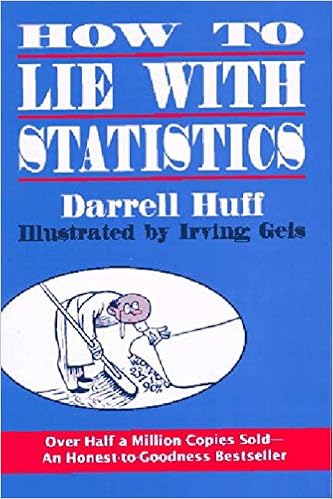OK I jumped to the end of the thread after reading a few posts.
Statistics don't lie but people do.
I took a statistics course in college and it was surprisingly one of the most difficult I had ever taken.
At on point I had taken both integral and differential calculus, analytical geometry and Vector Analysis and needed a higher math course to assure a general engineering math core so I figured Statistics should be a breeze. NOT!
Long story short, professor walked in on the first day of the course made an opening lecture in which he said (well one of the things) that you can make statistics prove almost anything.
e.g. If a study includes averages you MUST know WHAT METHOD of averaging is being calculated : mean, median or mode and you must also know the range. Are you being told these entities in the study?
No. Then you are a candidate for being snookered.
http://www.purplemath.com/modules/meanmode.htm
Also:
There are also several higher math formulas used in statistics for coming to different final results (lets use polling studies) with the same data depending on related variables which are not usually given in any of the Orwellian press releases fed to we the sheeple depending on which side of the aisle is behind the funding (not always available either).
e.g Weight - one variable in demographics is the percentage of the population in terms of preferential weights.
Does the study (lets say a poll) tell you what the percentage of the general population of those being polled is? (for instance) - 60% Republican, 30% Democrat, 5% Libertarian, 5% other?
Also, what is the random selection algorithm within the range?
Not divulged? Then you are probably being deceived.
And many other statistical math manipulations which we are NEVER (well usually never) told.
Don't get me started on GRAPHS!
HankD
Statistics don't lie but people do.
I took a statistics course in college and it was surprisingly one of the most difficult I had ever taken.
At on point I had taken both integral and differential calculus, analytical geometry and Vector Analysis and needed a higher math course to assure a general engineering math core so I figured Statistics should be a breeze. NOT!
Long story short, professor walked in on the first day of the course made an opening lecture in which he said (well one of the things) that you can make statistics prove almost anything.
e.g. If a study includes averages you MUST know WHAT METHOD of averaging is being calculated : mean, median or mode and you must also know the range. Are you being told these entities in the study?
No. Then you are a candidate for being snookered.
http://www.purplemath.com/modules/meanmode.htm
Also:
There are also several higher math formulas used in statistics for coming to different final results (lets use polling studies) with the same data depending on related variables which are not usually given in any of the Orwellian press releases fed to we the sheeple depending on which side of the aisle is behind the funding (not always available either).
e.g Weight - one variable in demographics is the percentage of the population in terms of preferential weights.
Does the study (lets say a poll) tell you what the percentage of the general population of those being polled is? (for instance) - 60% Republican, 30% Democrat, 5% Libertarian, 5% other?
Also, what is the random selection algorithm within the range?
Not divulged? Then you are probably being deceived.
And many other statistical math manipulations which we are NEVER (well usually never) told.
Don't get me started on GRAPHS!
HankD
Last edited:

